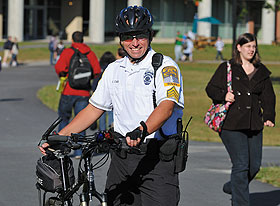  |
| HOME | THIS ISSUE | CALENDAR | GRANTS | BACK ISSUES | < BACK | NEXT > |
Police officers engage, educate University communityby Karen A. Grava - September 22, 2008
|
||||
| Christopher Casa may spend more time in a classroom than a professor, but he’s not on the faculty. And most of what he is teaching might be called “street smarts.” A sergeant in the internationally accredited UConn police department and the head of UConn’s community policing program, Casa concentrates on teaching students, faculty, and staff about safety. “My job is to break down the mystery of what the police do,” he says. Along with his colleague, Officer Thomas Ryba, Casa offers seminars and talks on a variety of topics, from workplace violence to sexual assault, drinking and driving, drugs, vandalism, and bike safety. “We teach people when to call 911, how to spot suspicious behavior, how to report a crime, and what to expect from the police,” he says. “We want to take the mystery out of what we do and keep the lines of communication with the students, faculty, and staff open.” It’s important for the UConn community to realize that they can call 911 if necessary, Casa says. People also need to be able to state exactly where they are – say, in the northeast corner of a building. “The goal of a 911 call is to paint a visual picture of what’s happening,” he says. “The bottom line is to stay safe.” Casa and Ryba maintain community police offices in the Fine Arts Building and the Student Union and teach a First-Year Experience course. They also offer a special six-hour program that includes a tour of the police department’s building on North Eagleville Road, and they explain exactly what the police department does. It is not unusual for them to be involved with 700 students in 30 classes during a single semester. Most of the time, students are shocked to discover that their seminar leader is a police officer. “Being an actual police officer is not like it is on television,” he says.
When he’s not teaching, Casa may patrol on foot, bicycle, or car; but most of the time, his job is to educate people rather than respond to calls made to the police department. “My door is always open to people who have questions,” he says. The most common question, he adds, is “How do you become a police officer?” The sites of the community police offices were chosen so the police would be visible and so people in high traffic areas would have a way to approach the police easily. Ironically, much of what Casa knows about community policing, he learned on the streets of New York. As a New York City police officer for nearly three years, the Long Island native found himself working in neighborhoods with diverse cultures. There, he developed relationships with business owners and residents. Casa, who has a bachelor’s degree from the State University of New York at Potsdam and a master’s degree from Eastern Connecticut State University, decided in high school that he wanted to be a police officer. But on the streets of New York, he figured out he would prefer to work for a smaller department, where he would have more control over a case and could work on something from start to finish. He already had ties to UConn, where his brother, Douglas Casa, is an associate professor of kinesiology, and his sister-in-law, Tutita, an assistant professor of educational psychology. But the real lure was the students. “In New York City, I was one of 40,000 police officers,” he says. “Here, I am part of a smaller force and I can concentrate on students, faculty, and staff.” |
| ADVANCE HOME |

